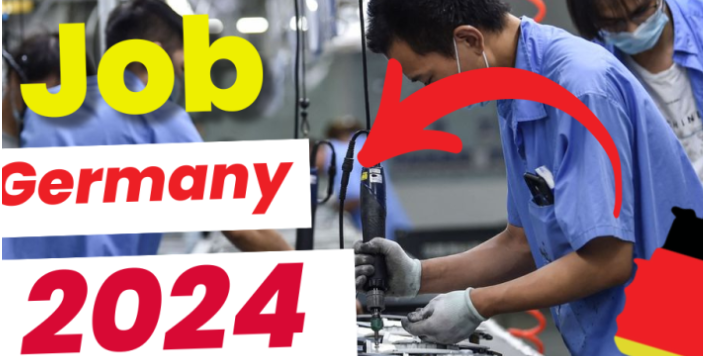Factory Workers Jobs in Germany 2024. Are you considering a factory job in Germany in 2024? You’re not alone! As one of Europe’s industrial powerhouses, Germany offers a wealth of opportunities for factory workers, from assembly lines to quality control. Whether you’re an experienced worker or just starting out, this guide will walk you through everything you need to know about factory jobs in Germany for the year 2024.
About Factory Workers Jobs in Germany
Sponsorship Visa : Yes
Position : Multiple
Number Of Vacancies : 10
Salary : $20 per hour
Education : Bachelor Degree/Diploma/High School
Location : Germany
The Demand for Factory Workers in Germany
Germany has always been known for its robust manufacturing sector, and the demand for factory workers is at an all-time high. With industries ranging from automotive to electronics ramping up production, 2024 is shaping up to be a pivotal year for those seeking employment in this field. The ongoing technological advancements and post-pandemic recovery efforts have only increased the need for skilled and semi-skilled workers.
Types of Factory Jobs Available
Manufacturing Roles
Factory jobs in Germany are diverse, with various roles available across multiple industries.
Assembly Line Workers
Assembly line workers are in high demand, especially in the automotive and electronics sectors. These workers are responsible for assembling parts and components in a systematic manner, ensuring that production meets the required standards.
Machine Operators
Machine operators play a crucial role in the manufacturing process. They operate and maintain machinery, ensuring that production runs smoothly. Experience with specific types of machinery can be a significant advantage.
Quality Control Positions
Quality control is vital in maintaining the reputation of German products. Workers in this area are responsible for inspecting and testing products to ensure they meet the stringent standards set by companies.
Inspectors
Inspectors examine products at various stages of production to ensure they meet quality standards. This role requires keen attention to detail and a good understanding of the production process.
Technicians
Quality control technicians often use advanced equipment to test products. This role may require specialized training, but it offers excellent job security and career advancement opportunities.
Logistics and Supply Chain Roles
The logistics and supply chain sectors are critical in factory operations, ensuring that materials and products move efficiently through the production process.
Forklift Operators
Forklift operators are essential in managing the movement of goods within factories and warehouses. Certification and experience in operating forklifts are often required for these positions.
Warehouse Staff
Warehouse staff play a key role in managing inventory, packing products, and ensuring that goods are shipped on time. This role is crucial in maintaining the efficiency of the supply chain.
Qualifications and Skills Required
While some factory jobs may not require extensive qualifications, having the right skills can significantly enhance your job prospects.
- Basic Requirements: Most factory jobs require a high school diploma or equivalent. Some roles may require physical fitness and the ability to work in a fast-paced environment.
- Specialized Skills: For roles such as machine operators or quality control technicians, specialized skills and experience with certain types of machinery or processes are highly valued.
- Language Proficiency: While some factory jobs may not require fluency in German, basic proficiency in the language is often beneficial, especially when working in teams or understanding safety instructions.
How to Apply for Factory Jobs in Germany
Applying for factory jobs in Germany is straightforward, but knowing where to look and how to present yourself can make all the difference.
- Application Process Overview: Start by researching the types of jobs that match your skills and interests. Tailor your resume to highlight relevant experience, and be prepared to provide references.
- Online Job Portals: Websites like Indeed, StepStone, and LinkedIn are great places to find factory job listings in Germany. Many companies also post job openings on their official websites.
- Working with Recruitment Agencies: Recruitment agencies can be a valuable resource, especially for non-German speakers. These agencies can help match you with suitable job opportunities and assist with the application process.

APPLY NOW
Visa and Work Permit Requirements
EU vs. Non-EU Citizens
Your nationality plays a significant role in determining the visa and work permit requirements for factory jobs in Germany.
Process for EU Citizens
If you’re a citizen of an EU or EEA country, you have the right to live and work in Germany without needing a visa or work permit. The process is relatively simple, and you can start working immediately after securing a job.
Process for Non-EU Citizens
Non-EU citizens will need to obtain a work visa and a residence permit to work in Germany. The process involves securing a job offer first, after which your employer will assist you in obtaining the necessary permits.
Blue Card for Skilled Workers
For those with higher qualifications, the EU Blue Card is an excellent option. It allows non-EU citizens to work in Germany in skilled positions, and it offers a pathway to permanent residency after a certain period.
Salary Expectations for Factory Workers
Salaries for factory workers in Germany can vary widely depending on the sector, location, and level of experience.
- Average Salaries by Sector: On average, factory workers in Germany can expect to earn between €25,000 and €40,000 per year. Specialized roles or those requiring technical skills may command higher salaries.
- Factors Influencing Pay: Experience, education, and the specific industry can all influence your salary. Jobs in metropolitan areas like Munich or Frankfurt may offer higher wages to offset the cost of living.
- Overtime and Bonuses: Many factory jobs offer overtime pay and bonuses, which can significantly boost your annual earnings.
Work Environment and Conditions
Working in a German factory is generally a positive experience, with strict regulations ensuring worker safety and well-being.
- Typical Working Hours: Factory workers typically work 35-40 hours per week, with some industries offering shift work. Overtime is common, especially in sectors with high production demands.
- Health and Safety Regulations: Germany has stringent health and safety regulations that employers must follow. Regular safety training and well-maintained equipment are standard in most factories.
- Work-Life Balance: Despite the demands of factory work, Germany places a strong emphasis on work-life balance. Workers are entitled to paid holidays, and many companies offer flexible working arrangements.
Benefits of Working in Germany
Germany offers numerous benefits to factory workers, making it an attractive destination for job seekers from around the world.
- Social Security and Healthcare Benefits: As an employee in Germany, you will be part of the country’s robust social security system, which includes health insurance, unemployment benefits, and pension plans.
- Opportunities for Career Advancement: Germany’s strong economy and focus on innovation provide ample opportunities for career growth. Many companies offer training programs and internal promotions for dedicated workers.
- Quality of Life in Germany: Germany is known for its high quality of life, with excellent public services, a strong economy, and a rich cultural scene. Whether you’re living in a bustling city or a quiet town, you’ll find plenty of opportunities to enjoy life outside of work.
Training and Development Opportunities
Continuous learning and development are key to success in the German job market.
- On-the-Job Training Programs: Many factories in Germany offer on-the-job training programs to help workers acquire new skills and adapt to changing technologies.
- Vocational Training and Apprenticeships: Germany’s dual education system is highly regarded, with vocational training and apprenticeships playing a crucial role in preparing workers for the job market. These programs often lead to well-paying jobs and long-term career opportunities.
- Continuous Professional Development: Workers in Germany are encouraged to pursue further education and training throughout their careers. This commitment to lifelong learning ensures that the workforce remains competitive and adaptable to industry changes.
Living in Germany as a Factory Worker
Living in Germany offers many advantages, but it’s important to be prepared for the practicalities of life in a new country.
- Cost of Living Overview: The cost of living in Germany varies depending on the region. While cities like Munich and Frankfurt can be expensive, smaller towns and rural areas offer more affordable living options.
- Housing Options: Finding accommodation can be challenging, especially in big cities. Many workers opt for shared apartments (WGs) or company-provided housing to save on costs.
- Cultural Integration Tips: Learning German, even at a basic level, can greatly enhance your experience in Germany. Additionally, participating in local events and activities can help you integrate into the community.
Conclusion
Factory jobs in Germany offer a stable and rewarding career path for both local and international workers. With a strong demand for skilled and semi-skilled labor, competitive salaries, and excellent working conditions, 2024 is an ideal time to consider a factory job in Germany. Whether you’re just starting your career or looking for a change, the opportunities in Germany’s manufacturing sector are plentiful.



